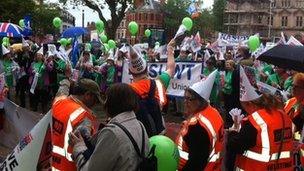Teachers announce one-day national strike
- Published

The unions held a one-day strike at the end of June in the north west of England
The two big teaching unions in England and Wales say they will stage a one-day strike later in the year.
Members of the NASUWT and the National Union of Teachers have also confirmed they will hold other regional one-day strikes in the autumn.
The unions are in dispute with the government over pay, conditions and pensions.
The government says it is disappointed and the action will disrupt children's education and inconvenience parents.
The unions staged a one-day strike at the end of June in the north-west of England, which they said affected 2,700 schools.
They say the new action will include rolling regional strikes in the week from 30 September and again in mid-October.
The date of the national strike has not yet been announced.
'Relentless attack'
The last national one-day strike by teachers was in November 2011 when union members joined other public sector workers in a walk-out.
Members of the unions are also currently involved in "action short of strike action" - a work-to-rule - in schools.
Chris Keates, general secretary of the NASUWT, said teachers and heads were very concerned and angry - and the government should take that seriously.
"The relentless attack on the teaching profession is damaging the morale of teachers and undermining the education of pupils," she said.
"The secretary of state has the opportunity to avoid further national strike action by demonstrating that he is willing to engage seriously on the issues that we have put to him."
The industrial action in the week beginning 30 September will be in the east of England, the East Midlands and West Midlands, Yorkshire and Humberside and in parts of Wales yet to be announced.
In the week beginning 14 October, the action will be in the north-east of England, London, the South East, the South West and in parts of Wales.
Inconvenience
A spokesman for the Department for Education said: "We are very disappointed that the NUT and NASUWT have announced they will be taking further strike action, which less than a quarter of teachers actually voted for.
"Industrial action will disrupt pupils' education, hugely inconvenience parents and damage the profession's reputation in the eyes of the public."
He added that government officials had been meeting regularly with the unions to discuss their concerns and and would continue to do so.
In March, the Education Secretary Michael Gove wrote to both unions, saying he was willing to meet them to discuss their dispute, but also that the "direction of travel" on the issues of pay and pensions was "fixed".
The government is moving away from a national pay framework for teachers and introducing more performance-related pay from the autumn.
Teachers are also going to have to pay more for their pensions and wait longer to take them, in line with other public sector workers.
In the NUT's ballot in September 2012, 82.5% voted in favour of strike action with a turnout of 27% while 82% of NASUWT members voted for industrial action, with a turnout of 40%.
- Published27 June 2013
- Published5 June 2013
- Published17 May 2013